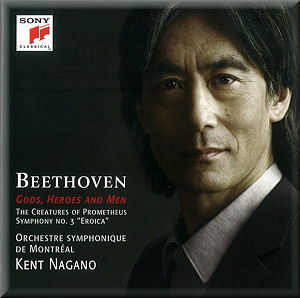 |
 |
| Kent Nagano’s Beethoven Series from
Montréal: The Story So Far |
| 
Buy
through
Arkivmusic
MDT
AmazonUK
AmazonUS
|
Ludwig van BEETHOVEN (1770-1827)
Ideals of the French Revolution
The General (realised by Paul Griffiths) [54:55]
Symphony No. 5 [34:07]
Egmont (excerpts) [12:29]
Opferlied [5:35]
 Orchestre Symphonique de Montréal/Kent Nagano
Orchestre Symphonique de Montréal/Kent Nagano
rec. Studio MMR, McGill University and Salle Wilfrid-Pelletier,
Montréal, September 2007 – March 2008
 RCA RED SEAL 88697400842 [54:55 + 52:11]
RCA RED SEAL 88697400842 [54:55 + 52:11]  |
| 
Buy
through
Arkivmusic
MDT
AmazonUK
AmazonUS
|
Ludwig van BEETHOVEN (1770-1827)
Gods, Heroes and Men
The Creatures of Prometheus (excerpts) [26:19]
Symphony No. 3, Eroica [48:03]
Additional data tracks featuring narrations by Yann Martel on the
theme of Prometheus [12:00, accessible via computer]
 Orchestre Symphonique de Montréal/Kent Nagano
Orchestre Symphonique de Montréal/Kent Nagano
rec. Studio MMR, McGill University and Salle Wilfrid-Pelletier,
Montréal (unspecified date)
 SONY CLASSICAL 88697857372 [74:23]
SONY CLASSICAL 88697857372 [74:23]  |
| 
Buy
through
Arkivmusic
MDT
AmazonUK
AmazonUS
|
Ludwig van BEETHOVEN (1770-1827)
In the Breath of Time
Symphony No. 6, Pastoral [41:12]
Symphony No. 8 [24:02]
Grosse Fuge (orchestral version) [17:05]
Declaration of Interdependence (David Suzuki) [3:27]
 Orchestre Symphonique de Montréal/Kent Nagano
Orchestre Symphonique de Montréal/Kent Nagano
rec. Studio MMR, McGill University and Salle Wilfrid-Pelletier,
Montréal, April-May 2011
 SONY CLASSICAL 88697923602 [41:08 + 49:19]
SONY CLASSICAL 88697923602 [41:08 + 49:19]  |
| |
My first encounter with the Orchestre Symphonique de Montréal
(OSM) came at this year’s Edinburgh International Festival where
they played an outstanding
concert which featured Beethoven’s Pastoral Symphony.
The strength of Nagano’s direction and the sheer warmth of the
string sound inspired me to explore their recent Beethoven series
on record and, as good timing would have it, their newest recording,
featuring the Pastoral, had just been released. Listening
to all these CDs close together gives a good impression of how
Nagano’s Beethoven has developed: comparing the 2007 recordings
with those of 2011, you can see that Nagano’s view of Beethoven
has evolved and matured, as he seems more at home in In the
Breath of Time than he did in Ideals of the French Revolution.
A few niggles still persist, though.
There are umpteen recordings of the Beethoven symphonies out
there, so any new versions have to have something distinctive
about them to stand out amongst the competition. Nagano’s strategy
is in some fairly innovative programming. Each disc is organised
around a theme, as you can see from their titles. In some cases
these are obvious, such as linking the Eroica with The
Creatures of Prometheus - outsized heroism an obvious connection,
as well as the fact that the Eroica finale is based on
a theme from Prometheus - sometimes, however, the link
is a little more obscure, such as joining the Sixth and
Eighth with the Grosse Fuge.
The most eccentric link and, I suspect, the one that will divide
listeners the most, is on the Ideals of the French Revolution
disc. Musicologist and writer Paul Griffiths has taken a
received – if not universally approved of – view of the Fifth
Symphony as “a paean to Revolutionary hope” and used this as
an opportunity to explore some of Beethoven’s other “Revolutionary”
music. The subject matter of Goethe’s Egmont could pass
as an example of this, and the excerpts from Beethoven’s incidental
music to the play are done well, including a noble solo from
Canadian soprano Adrianne Pieczonka. More controversial, however,
is Griffiths’ main contribution. In The General he has
taken a selection of music from Egmont and excerpts from
other obscure Beethoven works, such as the music for König
Stephan, the little known Opferlied and the even
less well known music for Duncker’s play, Leonore Prohaska.
His linking framework for these movements is a text from the
memoirs of Roméo Dallaire, head of the UN Peacekeeping mission
in Rwanda before the genocide, who could see the catastrophe
approaching but was refused the means to prevent it. The excerpts
from Dallaire’s writings are read by an actor and the specific
references removed as an attempt to universalise their message.
The Beethoven excerpts are then used as attempts to comment
on the situations and ideas expressed in the words. The sung
excerpts are also given new English words that seem to have
only a tangential link to the original German. Griffiths is
effectively trying to create a new work out of these elements,
and we should be grateful to him for trying to bring to closer
attention some very good but very neglected music in Beethoven’s
canon. The extracts are also well played by the orchestra, and
Nagano whips up exciting energy for the Egmont overture.
Too often, however, the arrangements seem rather random to my
ears or, at their worst, Griffiths resorts to the lamest form
of musical association with words. The fourth Egmont
Entr’acte, for example, sounds like a cry of pain after Dallaire
is told by HQ that he is to do nothing, and this then becomes
a Pastoral interlude as he takes a drive in the country. It’s
a bit too hackneyed to bear repeated listening, and the music
and words don’t shed any light on one another. However, it’s
good to spotlight some music that is seldom heard, even though
the fundamental basis of the project seems, to my ears, a little
misguided.
The Grosse Fuge, performance is more successful, even
though the link with the surrounding symphonies is poorly justified:
there are times when it moves with granite-like force, and other
moments of delicacy, particularly in the central section, when
it’s easier to remember that this was originally written for
a string quartet. The Prometheus music, also, is probably
the most successful of all the “extras”: the overture gallops
along at a cracking pace and Nagano’s ear for tempi means that
you never forget that this is ballet music. However,
both these discs finish with some unnecessarily portentous,
almost self-conscious non-musical narratives: Martel’s commentary
on Prometheus is preachy without any great consequence,
while Suzuki’s Declaration of Interdependence just sounds
odd, especially in this context, addressing as it does the need
of all peoples and beings to get along with one another. I guess
you could just about argue a link if you tried hard enough,
and goodness knows Nagano certainly tries hard in his booklet
essays, but no-one is going to buy a CD of Beethoven symphonies
based on these.
So what of the symphonies themselves? Each performance is good,
if not world-beating, and it’s definitely a sense of improving
with time. The earliest performance, the Fifth from 2008,
is solid and dependable, without being exceptional. As I noticed
when I heard them in Edinburgh, Nagano’s approach to Beethoven
is unashamedly old school: he goes for muscular sound and, often,
broad tempi, and you are never in any doubt that you are listening
to a symphony orchestra. It’s an approach I broadly like,
though it’s not distinctive enough in the Fifth. Nagano
does, however, use the edition of the text that includes the
repeat of the whole Scherzo and Trio in the third movement,
something which, to my ears, unbalances the movement, but that’s
a matter of taste. His finale is the most successful, with a
real sense of momentum and drive that is at its most thrilling
at the start of the exposition repeat, where Nagano pulls out
an extra stop that we didn’t know he had.
Most of the Eroica is well done, but the first movement
is a problem. Here Nagano seems to fall into the worst of the
old school habits, partly with his choice of pacing but, more
seriously, with the way he controls the unfolding of Beethoven’s
symphonic argument. His first movement doesn’t quite drag, but
it’s noticeably slower than more recent interpreters such as
Mackerras, Harnoncourt, or even Rattle. I suspect, however,
that it feels a lot slower than it really is because
Nagano seems to lack a real sense of impetus or forward momentum.
Karajan in 1962 is comparable as, in fact, is Vänskä’s
recent Minnesota disc, but both of those conductors have a more
secure sense of where this music is going, whereas Nagano seems
to be following it rather than directing it. When the coda came
there was no sense of elation or of a goal achieved: the music
just seemed to come to a stop. The other movements are finer,
with a large-scale, brooding Funeral March, a filigree Scherzo
and an impressive finale, which is far more satisfying than
its opening counterpart, but many listeners will be put off
by a lacklustre first movement, especially when there are so
many other performances that do the job much better.
The most recent disc, In the Breath of Time, is for me
the most successful. The performance of the Eighth unites
the best of the old and the best of the new; a large-scale performance
which takes its time but doesn’t wallow and enjoys the swagger
of the Menuet as well as the humour of the finale. Maybe
it’s because I heard them play it so well in the Usher Hall,
but I found their reading of the Pastoral to be the most
enjoyable of all, a rich, effusive sound, crowned by string
tone that you could take a warm bath in. If there are times
when Nagano wallows a little then this doesn’t get in the way
of a broader sense of structure that leavens the texture for,
say, the bird calls of the second movement or the skirling dance
of the peasant gathering. This is a hugely enjoyable performance
and, together with the Grosse Fuge (though not the Declaration
of Interdependence!) this is, for my money, the most successful
disc in the series so far.
I’m not sure whether this team are planning a complete cycle,
but I’ll certainly keep my eyes open for future instalments.
In spite of my misgivings, there are a lot of good things on
display on these discs and, even if you don’t fully buy into
the extras, Nagano’s attempt to make us look at Beethoven through
new eyes is a laudable one. Above all, these discs confirm the
strength of the Montrealers as an orchestral team, with beautiful
playing and always top notch recording from the Sony/BMG engineers.
Simon Thompson
|
|












